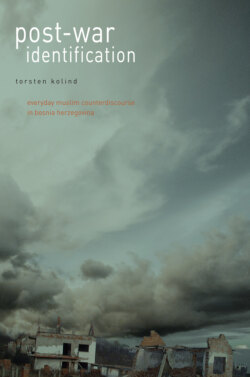Читать книгу Post-War Identification - Torsten Kolind - Страница 41
На сайте Литреса книга снята с продажи.
Problems with forgetting
ОглавлениеThe evocative power of words was one reason why my informants wanted to forget. Telling someone about horrible events can make them come alive (see also Jackson 2002: 57; Perera 2001: 159). If people did choose to talk about experiences like internment in a prison camp, the horrible time in Blagaj, or the expulsion, they would often only say a little and then stop. They did not want to talk about it because it was like reliving the experience. We see this clearly in the following excerpt from my notebook about a man called Emir, who had been interned in a prison camp with three thousand prisoners and only thirtythree plates and spoons:
Emir: So nearly 100 of us had to share each spoon and plate. When the Red Cross arrived, we washed the spoons for the first time. We had very little time to eat, 15 seconds.
TK: Was it hot food?
Emir: Yes it was soup. We slept on the floor on the concrete. 500 in one hangar. There were no blankets, and if you had to pee, you just had to do it where you were.
He suddenly stops talking, I can feel that he is moving towards the limit of where he still can talk and keep things at a distance. I say that it is impossible to understand how people can do such things to others. He answers that if you could, you would be like them.
According to Anvere, people’s and especially men’s attempts at forgetting are rather general, as she straightforwardly ascertained about her husband.
Nihad he has not told me about the prison camp, he can’t manage. No men tell about their experiences from there, well yes a little when they drink loza [grape brandy].
Like speech, television is a strongly evocative medium. Once the film Welcome to Sarajevo, which depicts the horrendous time during the siege of Sarajevo, was shown on television. Seeing the film with my hosts was a tough emotional experience. We all sat watching: nobody said a word except my landlady, who kept sighing. Her husband, who normally likes to eat the hot popcorn his wife makes, did not touch it. After the film nobody spoke, and we all went to bed. The day after several people asked if I had seen the film. Safet said that when he saw it everything came back to him. He told me how he had relived a lot of episodes from the war, and had not fallen asleep until 4 am. Nusret’s father, on the other hand, said that he only saw the first ten minutes. He had seen it all in real life, he explained, and did not need to see it again.
My informants’ intentions to forget were often sabotaged by the way the subject of the war would surface in many everyday conversations. Anything could function as a trigger of episodes from the war, as the following examples show. My father visited me for four days while I was doing fieldwork, and I remember how it struck me that on the first evening he was with me in my host family’s company, we only talked for about half an hour about the things one normally converses with foreign guests about, such as climate, buildings, family relations, food and so on. At this point the conversation changed topic and we concentrated on the war and the present problems. It was impossible to carry on a ‘normal’ (non-war-related) conversation. Once Osman offered me a cigarette, a Bosnian cigarette labelled Drina. He asked if I knew the River Drina, and I said yes, it is located at Visegrad, which then led him to talk about the war, starting with the atrocities committed by Serbs in that town. And at a child’s birthday party, my comments about the lovely food we were served led to a discussion about the lack of food during the war. Often people did not even need a cue. Experiences from the war often erupted spontaneously.
